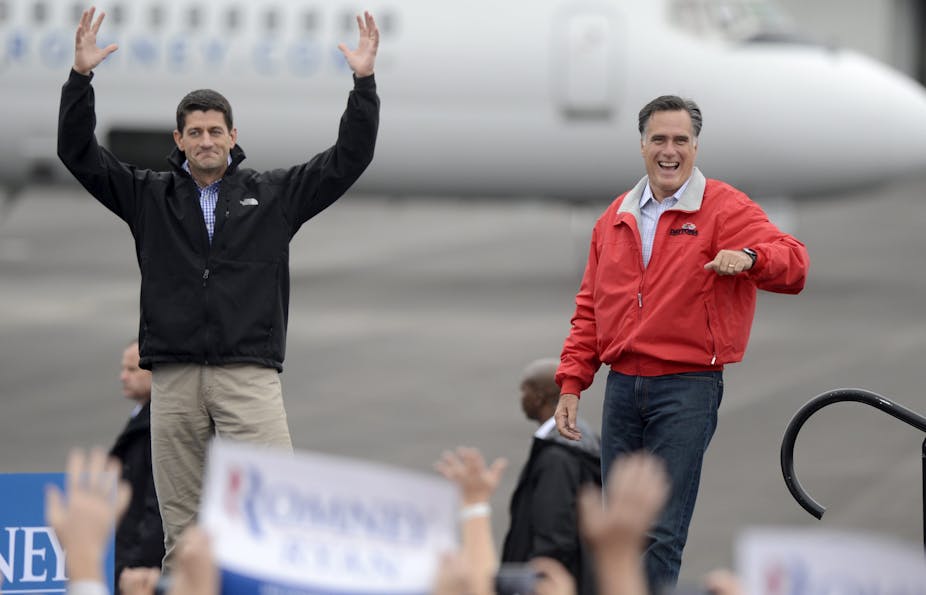A vice president is usually brought in to complement the president’s vision and policies. However, this year, it was the Republican presidential candidates who had to tailor their own platforms to the blueprint put forward by Wisconsin congressman and vice presidential nominee Paul Ryan.
The GOP’s 2012 budget proposal, often referred to as the Ryan plan, was passed by the House of Representatives with only four Republican “nay” votes. “To envisage what Republicans would do if they win in November,” Ryan Lizza wrote in an August New Yorker article, “the person to understand is not necessarily Romney, who has been a policy cipher all his public life. The person to understand is Paul Ryan.”
The 2008 vice presidential debate was noteworthy because it featured a personable and yet unpredictable Republican candidate in Sarah Palin. Thursday’s debate is noteworthy for a more substantive reason: the current candidate has a played a central role in shaping the party’s agenda over the last several years.
Mitt Romney’s campaign platform borrows considerably from the Republican budget proposal that Ryan drafted. Like the Ryan plan, Romney advocates for large scale tax cuts - a 20% across the board reduction in rates - that are to be offset by eliminating certain deductions and tax exemptions. The nonpartisan Tax Policy Center concluded it would be impossible to do so without shifting the tax burden to lower income individuals.
The Romney camp also promises to move towards a balanced budget by capping all government spending at 20% of gross domestic product. The large-scale spending cuts that this would require would have been unpalatable for mainstream Republicans politicians a few years ago. However, Ryan and others such as anti-tax crusader Grover Norquist, have been extremely effective in shifting the terms of the debate and moving the party decidedly rightward on fiscal policy.
As Sam Youngman rightly observes, since joining the ticket Ryan has become “more prudent” and reluctant to engage in “detailed discussion of his budget plan”. This change is reflective of the Romney campaign as a whole. In last week’s debate, the former Massachusetts governor presented himself as a pragmatic technocratic, more interested in tinkering with the mechanisms of government than dramatically overhauling the system. Such rhetoric exposes a growing divide between the campaign rhetoric and the more hardline party platform.
Incumbent Vice President Joe Biden’s task in the the upcoming debate is to block Ryan and the Republicans’ play for the ideological centre. However, it won’t be easy. The vagueness of many of the Romney-Ryan proposals allows much room for manoeuvring making it difficult to tie the campaign to unpopular cuts or potentially deficit exploding tax cuts.
Last week, Barack Obama mostly abstained from sharp attacks on his Republican opponent, opting instead for a more soporific back-and-forth discussion of policy. It was a mistake then and would be equally disastrous this time around. Ryan is adept at playing the role of political wonk and is difficult to defeat in an in the weeds policy debate even if the larger budget numbers he’s defending don’t always add up.
If Biden wants to win, he’s going to have to challenge Ryan in clear simple terms. For instance, asking specifically which deductions the Romney campaign would eliminate to make up the lost revenue from their proposed tax cuts and not letting the congressman off the hook until he provides an answer.
Is the vice president up to the task? I get the sense that many people aren’t giving the gaffe-prone Biden much of a shot. But, re-watching his showdown with Sarah Palin, I was impressed with how poised he can be. Biden has a reputation for being undisciplined, but he remained focused and on point throughout the 2008 debate. He’ll need to be every bit as impressive this time around if he wants to out-duel the much heralded Ryan and regain the momentum in what’s quickly become a very tight race.

